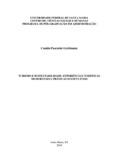| dc.creator | Grellmann, Camila Pascotini | |
| dc.date.accessioned | 2019-04-03T12:43:24Z | |
| dc.date.available | 2019-04-03T12:43:24Z | |
| dc.date.issued | 2018-04-19 | |
| dc.identifier.uri | http://repositorio.ufsm.br/handle/1/16048 | |
| dc.description.abstract | This work had as its main objective to analyze the possible relation between memorable tourist experiences and sustainable practices. To better understand the content, a theoretical review was made on: tourism and sustainability, economy of experience and a memorable tourist experience. Through a quantitative research (survey method), questionnaires were applied to 421 tourists, making it possible to identify their sustainable practices and perceptions about a memorable tourist experience. Furthermore, through the answers of one open question, possible contributions and learning from the experiences of the tourists were indicated. The results of this study showed that most participants practice sustainability when traveling for tourism. However, the environmental impact is not usually considered when planning their travels. There is still much to evolve regarding better choices and attitudes. Only through the development of sustainable practices it will be possible to achieve favorable tourism for all. Concerning perceptions about the memorable tourist experience the results indicated that all dimensions - hedonism, novelty, local culture, knowledge, renewal, significance and involvement - proposed by Kim (2009) were relevant. However, there were still differences and some contributed more than others to make the experience memorable. What stood out the most was hedonism, followed by knowledge, involvement, novelty, renewal, local culture and significance. The relationship between memorable tourist experience and sustainable practices was analyzed using Pearson's correlation coefficient, which identified a significant correlation among almost all constructs. There was only no significant correlation between sustainable practices and renewal. From the dimensions of the memorable tourist experience, knowledge was the one that presented the greatest association with sustainable practices. It has been found that the greater the memorable tourist experience, the more sustainable practices are likely to occur and vice versa. It is possible to conclude that, once a company facilitates memorable tourist experiences, based on the principles of sustainability, tourists will be able return to their regular lives with new knowledge, which can generate attitude changes and contribute to a better world. It is hoped, therefore, that the results presented in this study will contribute not only to the academic field, but also to the administrators of tourist organizations. | eng |
| dc.language | por | por |
| dc.publisher | Universidade Federal de Santa Maria | por |
| dc.rights | Attribution-NonCommercial-NoDerivatives 4.0 International | * |
| dc.rights.uri | http://creativecommons.org/licenses/by-nc-nd/4.0/ | * |
| dc.subject | Turismo | por |
| dc.subject | Experiências memoráveis | por |
| dc.subject | Práticas sustentáveis | por |
| dc.subject | Tourism | eng |
| dc.subject | Memorable experiences | eng |
| dc.subject | Sustainable practices | eng |
| dc.title | Turismo e sustentabilidade: experiências turísticas memoráveis e práticas sustentáveis | por |
| dc.title.alternative | Tourism and sustainability: memorable tourism experiences and sustainable practices | eng |
| dc.type | Dissertação | por |
| dc.description.resumo | Este trabalho teve como objetivo principal analisar a possível relação entre experiências turísticas memoráveis e práticas sustentáveis. Para melhor compreensão do conteúdo foi feita uma revisão teórica sobre: turismo e sustentabilidade, economia da experiência e experiência turística memorável. Por meio de uma pesquisa de cunho quantitativo (método survey), questionários foram aplicados com 421 turistas, sendo possível identificar suas práticas sustentáveis e percepções sobre experiência turística memorável. Além disso, por meio das respostas de uma pergunta aberta foram indicadas possíveis contribuições e aprendizados a partir das experiências dos turistas. Os resultados deste estudo mostraram que a maior parte dos respondentes pratica a sustentabilidade ao viajar a turismo. No entanto, o impacto ambiental não costuma ser considerado no momento do planejamento de suas viagens. Ainda há muito o que evoluir com relação a melhores escolhas e atitudes. Somente por meio de desenvolvimento de práticas sustentáveis será possível alcançar um turismo favorável a todos. No que se refere às percepções sobre a experiência turística memorável, os resultados indicaram que todas as dimensões - hedonismo, novidade, cultura local, conhecimento, renovação, significância e envolvimento - propostas por Kim (2009) foram relevantes. Porém, ainda assim houve diferenças e algumas contribuíram mais que outras para que a experiência se tornasse memorável. O que mais se destacou foi o hedonismo, seguido do conhecimento, envolvimento, novidade, renovação, cultura local e significância. A relação entre experiência turística memorável e práticas sustentáveis foi analisada por meio do coeficiente de correlação de Pearson, o qual identificou correlação significativa entre quase todos os construtos. Apenas não houve correlação significativa entre as práticas sustentáveis e a renovação. Das dimensões da experiência turística memorável, o conhecimento foi o que apresentou maior associação com as práticas sustentáveis. Constatou-se que quanto maior for a experiência turística memorável, mais tende a ocorrer práticas sustentáveis e vice-versa. Pode-se aí concluir que, a partir do momento em que uma empresa facilita experiências turísticas memoráveis, baseadas nos princípios da sustentabilidade, o turista poderá retornar a sua realidade com novos aprendizados, os quais poderão gerar mudanças de atitudes e contribuir para um mundo melhor. Espera-se, assim, que os resultados apresentados sirvam de contribuição não somente para o âmbito acadêmico, mas também aos gestores de organizações turísticas. | por |
| dc.contributor.advisor1 | Madruga, Lúcia Rejane da Rosa Gama | |
| dc.contributor.advisor1Lattes | http://lattes.cnpq.br/6101538332418762 | por |
| dc.contributor.referee1 | Traverso, Luciana Davi | |
| dc.contributor.referee1Lattes | http://lattes.cnpq.br/4939993298300369 | por |
| dc.contributor.referee2 | Vianna, Silvio Luiz Gonçalves | |
| dc.contributor.referee2Lattes | http://lattes.cnpq.br/2627794239193071 | por |
| dc.creator.Lattes | http://lattes.cnpq.br/6126637589081374 | por |
| dc.publisher.country | Brasil | por |
| dc.publisher.department | Administração | por |
| dc.publisher.initials | UFSM | por |
| dc.publisher.program | Programa de Pós-Graduação em Administração | por |
| dc.subject.cnpq | CNPQ::CIENCIAS SOCIAIS APLICADAS::ADMINISTRACAO | por |
| dc.publisher.unidade | Centro de Ciências Sociais e Humanas | por |



